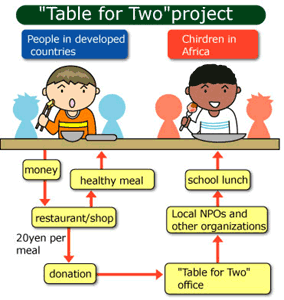Hunger and Obesity in Children
Reflecting on our food environment
In the world today, some children suffer from hunger while other children suffer from obesity.
Through our investigation of this issue, we learned that it isn't always possible to say that "The rich become obese" and "The poor go hungry." In fact, many of the children who suffer from obesity live in developing countries. Poverty, in such cases, can actually lead to people becoming overweight.
Obesity is the cause of a variety of diseases. In order not to gain too much weight, it's important to eat at regular times and get suitable exercise. It isn't good for your health, either, to become preoccupied with your body and diet excessively. Not only individuals, but society as a whole must come to terms with food-related health problems.
Children have the right to grow up in good health. How can we address today's global problems involving hunger and obesity?
| 35 million obese children in developing countries Cheap junk food is the cause |
According to the World Health Organization (WHO), about 43 million preschool children in the world today are suffering from obesity. Obesity involving children is becoming a serious health problem in the 21st century.
We contacted an expert on this problem via email. Godfrey C. Xuereb, 48, of WHO told us that nearly 35 million of these 43 million children live in developing countries. The reason for this obesity is because people in these nations are able to obtain foods containing sugar, fat, and salt at cheaper prices than fruits and vegetables. Advertisements promoting fatty foods also sway children away from choosing healthier alternatives.
The upshot is that obesity is accompanied by malnutrition. Cheaper foods that are loaded with fat and sugar don't contain enough vitamins and minerals, so while eating such foods leads to obesity, it brings about malnutrition as well.
Mr. Xuereb points out that children are influenced by their environment and suggests that a suitable environment must be created for children to maintain good health. He says that appropriate policies in connection with agriculture, city planning, and education are needed, too. Children should limit their sugar and salt intake, he advises, and instead increase the amount of fruits, vegetables, and beans they eat. In addition, children aged 5 to 17 should engage in at least one hour of physical activity every day. (Seira Furukawa, 17)
| Sufficient food in the world Hunger can be eliminated if food doesn't go to waste |

Despite the fact that there is enough food in the world to feed everyone, the problems of starvation and obesity persist. What can be done to address this situation? We spoke with Tomoko Sakuma, 44, a board member of the NPO Pacific Asia Resource Center, based in Tokyo.
Ms. Sakuma urges people to be more mindful of food issues. Most corn, she pointed out, is consumed as feed for livestock that is then eaten by people in developed countries. A lot of food in developed countries goes to waste, too, and this food, if used more wisely, could help eliminate starvation.
Japan subsists mainly on imported food. Ms. Sakuma says that people should know the answers to such questions as "Where does the food we eat each day come from?" and "What kinds of food are produced in our local area?" She stresses that if the Japanese can become more self-sufficient in terms of our food supply, we will be able to reduce the amount of food that we must import from overseas. "It might even make it possible to give back what we have taken from the world," she says.
Hunger can't be eliminated, Ms. Sakuma went on, if we persist with a system in which agricultural products that are produced in developing countries aren't priced fairly. She added that choosing "fair trade" goods over other products is also an important measure. (Yusuke Suemoto, 14)
|
| Donations for healthy school lunches縲 Yamaguchi Prefectural University takes part |

|

|
| Ayumi and Miho (the two on the right) are supporters of the TFT effort to impact, at the same time, the problems of both hunger and obesity. |
6.4 million meals to children in five African nations
A system exists in which 20 yen from the price of a healthy meal will go toward providing a school lunch to a child at a school in Africa. This effort to offer meals to African children was launched in 2007 by the Tokyo-based NPO "Table for Two" (TFT) and is aimed at addressing both the issues of obesity in developed countries as well as hunger in developing countries. Since then, a long list of companies and universities in Japan have lent their support to the project.
To date, TFT has provided about 6.4 million school lunches to 60 elementary schools and kindergartens in the nations of Ethiopia, Uganda, Rwanda, Malawi, and South Africa. Most of the children in these schools are only able to eat one meal a day, their lunch at school.
Michiko Ando, 28, a TFT staff member, visited Rwanda in September 2010. The words of a person she met there still linger in her mind. "I don't feel discomfort," she was told, "because my body is used to having little food since the time I was born. However, if we start suffering from malnutrition and, as a consequence, become less resistant to viruses, this can lead to a contagious and deadly disease. That's the problem." Ms. Ando heard what a hardship it had been when the school lunch program was once suddenly stopped and it made her feel determined to continue carrying out the TFT mission. (Mako Sakamoto, 14)
"I want the number of smiles to increase"
One of the TFT supporters is a student group at Yamaguchi Prefectural University. The group is composed mainly of first- and second-year students and, since 2009, they have been serving lunches at the school cafeteria and school festivals which have an appropriate number of calories and promote good health.
To date, they have made 11 different types of meals, according to season, and sold a total of 924 meals. The meals have included noodles simmered in soybean and miso broth and muffins made with yogurt and strawberries.
Miho Nakamoto, 20, a member of the group and a second-year student, stressed to us that, "Food distribution in the world isn't fair, and there are children who don't get enough to eat. We want other students and the local people to know about this situation."
Another member of the group, Ayumi Takaie, 20, says, "I hope the number of children eating school lunches in Africa and the number of their smiles will continue to increase. I want to take on this global issue as my own problem and make an effort to help resolve it." (Mei Yoshimoto, 14, and Arata Kono, 13; Arata Kono also served as photographer)
Yoshikazu Nishi, 62, a doctor at Hiroshima Red Cross Hospital & Atomic-bomb Survivors Hospital, emphasized to us that "Obesity in childhood often persists after the child has grown and can result in lifestyle-related disease such as diabetes and high blood pressure. The problem must be addressed within the family." Childhood obesity is connected to eating meals at irregular times, a lack of exercise, stress, and body type. As examples, if children eat their meals alone every day, they won't get the proper nutrition; late-night snacking, too, can be detrimental to their health. Other harmful factors include playing video games and using the computer too much at home, which deprives children of the chance to spend more active time outside, and mounting stress which can bring about overeating. Dr. Nishi recommends that we "eat more vegetables and chew your food well, taking your time when you sit down for a meal." He says that we should get enough exercise, too, such as jogging or jumping rope with members of your family. He advises regular visits to a local pediatrician, too. At the same time, he warns us not to cut back on calories to an extreme as this can be harmful to proper growth. We must avoid becoming overly concerned about obesity as sometimes this fear can lead people to excessive dieting and an emaciated state. (Masataka Tanaka, 16)
|
|
